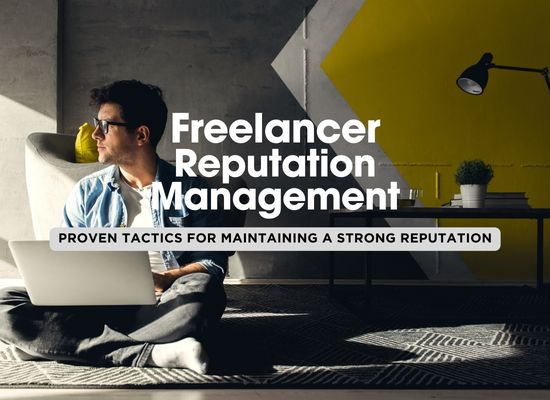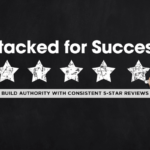The gig economy has opened doors for independent contractors and freelancers to work with flexibility and autonomy. However, one of the biggest challenges they face is managing their reputation. Since gig workers often rely on online platforms and client reviews to secure future work, a single negative experience can have lasting impacts on their reputation and income.
1. Maintain Consistent, High-Quality Work 💪
The foundation of a strong reputation in the gig economy is consistently delivering high-quality work. Freelancers and contractors should always ensure that their output meets or exceeds client expectations. Quality is not just about the final product but also the overall experience—the speed, communication, and reliability matter just as much.
Why It Works:
- Builds Trust: Consistently delivering quality results encourages clients to leave positive reviews and recommend you.
- Reputation Growth: High-quality work leads to repeat business and positive word-of-mouth, essential for long-term success.
How to Get Started:
- Prioritize clear communication and understanding of the project’s scope before starting any work.
- Set realistic timelines and manage expectations from the outset.
- Continuously improve your skills to stay competitive in your field.
2. Respond Promptly to Feedback, Both Positive and Negative 📝
Freelancers often operate in a review-based system where feedback—both good and bad—plays a major role in shaping their reputation. Responding promptly to feedback, whether it’s a glowing review or a constructive criticism, shows professionalism and an ability to handle criticism gracefully.
Why It Works:
- Shows Professionalism: Quick responses show you value feedback and respect your clients’ opinions.
- Strengthens Relationships: Addressing negative feedback in a thoughtful manner can convert a dissatisfied client into a loyal one.
- Builds Credibility: A freelancer who handles reviews with maturity is seen as trustworthy and reliable.
How to Get Started:
- Set up alerts to notify you of new reviews or feedback.
- Craft thoughtful responses, especially to negative comments, focusing on resolving the issue.
- Thank clients for positive feedback and show appreciation for their trust.
3. Proactively Build an Online Presence 🌐
Having a strong online presence is essential in the gig economy. It’s not enough to just rely on platform reviews; freelancers should take ownership of their reputation by creating professional profiles on multiple platforms like LinkedIn, personal websites, or industry-specific sites. Regularly updating these profiles and engaging with your audience can build a well-rounded, positive image.
Why It Works:
- Increases Visibility: A strong online presence helps potential clients find you and learn about your work before reaching out.
- Showcases Expertise: An active, well-crafted profile helps establish your authority in your niche.
- Attracts Better Opportunities: A solid reputation online opens doors to higher-paying and more reputable clients.
How to Get Started:
- Update your LinkedIn and freelance platform profiles regularly with recent work samples and client testimonials.
- Create a personal website that highlights your portfolio, work experience, and contact details.
- Engage with industry groups and forums to expand your network and gain recognition.
4. Network with Industry Professionals and Clients 🤝
Building strong relationships with clients and other professionals in your industry can significantly boost your reputation. Networking isn’t just about securing new gigs; it’s also about learning from others, gaining referrals, and positioning yourself as a respected member of your field.
Why It Works:
- Increased Referrals: Networking helps you build a referral pipeline, which can be a major source of new business.
- Learn from Peers: Interacting with other professionals gives you insights into best practices and emerging trends.
- Stronger Client Relationships: Regular contact with clients can help you secure repeat business and stay top-of-mind.
How to Get Started:
- Attend industry events, webinars, and conferences (even virtual ones) to connect with other professionals.
- Reach out to previous clients to check in and see if they need any additional work or services.
- Join professional networks and online forums to expand your community and increase visibility.
5. Offer Exceptional Customer Service 🌟
Delivering excellent customer service is a powerful way to build a reputation. Going above and beyond to ensure your clients feel valued will not only secure repeat business but also encourage positive reviews and word-of-mouth recommendations.
Why It Works:
- Builds Client Loyalty: Great customer service fosters long-term relationships and encourages repeat business.
- Positive Reviews: Clients are more likely to leave positive feedback when they feel their needs were prioritized.
- Competitive Advantage: Offering outstanding service can set you apart from other freelancers in your industry.
How to Get Started:
- Communicate clearly and regularly with clients to ensure their expectations are being met.
- Be proactive in solving any issues and addressing client concerns quickly.
- Follow up after completing a project to ensure satisfaction and offer further assistance if needed.
6. Build and Showcase a Portfolio of Work 📂
A well-organized portfolio is essential for any freelancer or independent contractor. A portfolio acts as a visual representation of your abilities and provides potential clients with proof of your expertise. Whether you’re a writer, designer, or developer, showcasing your best work will attract new clients and reinforce your credibility.
Why It Works:
- Proves Your Expertise: A strong portfolio highlights your skills and makes you more attractive to potential clients.
- Demonstrates Your Range: A diverse portfolio shows that you can handle a variety of projects and adapt to different needs.
- Attracts Higher-Paying Gigs: Clients are more likely to pay a premium for a freelancer with a solid portfolio that aligns with their needs.
How to Get Started:
- Choose your best and most relevant work to feature.
- Create an easy-to-navigate online portfolio using platforms like Behance, Dribbble, or your personal website.
- Regularly update your portfolio with new projects to showcase your evolving skills.
7. Establish Clear Contracts and Expectations 📑
One of the best ways to protect your reputation is to establish clear contracts with clients. A written agreement outlines the scope of work, deadlines, payment terms, and any other important details. Clear expectations reduce the likelihood of misunderstandings and help you avoid negative feedback.
Why It Works:
- Prevents Misunderstandings: A contract sets mutual expectations, reducing the chance of disputes or dissatisfaction.
- Builds Professionalism: Clients will see you as a serious and reliable professional who values structure.
- Protects Your Rights: A solid contract safeguards your interests, ensuring you’re paid fairly and on time.
How to Get Started:
- Use simple contracts that cover key points, including deliverables, timelines, and payment terms.
- Always have a signed agreement in place before beginning a project, even for short-term tasks.
- Consider using contract templates or legal services to create professionally vetted documents.
8. Monitor Your Online Presence Regularly 🔍
It’s important to regularly monitor your online presence to ensure that your reputation stays intact. Setting up Google Alerts for your name, company, or niche can help you stay informed about what others are saying about you online. Regularly checking social media mentions and reviews can also help you address any issues before they escalate.
Why It Works:
- Quick Issue Resolution: Monitoring your reputation lets you catch negative comments or misinformation early.
- Improves Visibility: Regular monitoring allows you to keep your profiles updated and visible to potential clients.
- Proactive Approach: Monitoring online sentiment allows you to manage your reputation proactively instead of reactively.
How to Get Started:
- Set up Google Alerts to receive notifications whenever your name or brand is mentioned online.
- Use social media listening tools to track mentions and engagement across various platforms.
- Regularly check review sites and respond to any feedback, especially negative comments, in a timely and professional manner.
As a freelancer or independent contractor, your reputation is your most valuable asset. By following these key steps—delivering high-quality work, responding to feedback, maintaining a strong online presence, networking, offering exceptional customer service, showcasing a portfolio, using contracts, and monitoring your reputation—you can safeguard and grow your standing in the gig economy. These strategies will help you not only secure more business but also create long-term, successful relationships with clients.



